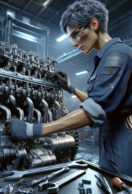A Comprehensive Comparison with Regular Gasoline Engines
Introduction: Comprehending the fundamental dissimilarities between diesel and gasoline engines is crucial for any automotive enthusiast or individual interested in understanding how different types of engines function. Diesel engines, known for their efficiency and torque output, operate by compressing air in the combustion chamber to ignite the fuel without the need for a spark plug. On the other hand, gasoline engines rely on a spark plug to ignite a fuel-air mixture, offering smoother acceleration and higher RPM capabilities. By delving into these key distinctions, one can gain a deeper insight into the inner workings of these two prevalent engine types found in various vehicles across the globe.
Efficiency and Fuel Economy: Why Diesel Engines Excel in this Aspect
When it comes to fuel efficiency, diesel engines are known for their impressive mileage capabilities compared to gasoline engines. By comparing gas mileage between diesel and gasoline engines, one can easily see the significant differences in fuel economy performance. This comparison showcases how diesel engines typically offer better fuel efficiency and higher mileage, making them a popular choice for those looking to save on fuel costs in the long run.
Power and Torque: How Diesel Engines Deliver Superior Performance
When analyzing the differences between diesel and gasoline engines in terms of torque, it's crucial to understand that diesel engines generally generate higher torque levels due to their unique design and combustion methodology. This inherent characteristic grants diesel engines a competitive edge in terms of horsepower when compared to gasoline engines. The comparison of power output frequently emphasizes the superior torque attributes of diesel engines, positioning them as ideal choices for heavy-duty applications that demand enhanced pulling force and operational efficiency. Diesel engines excel in scenarios where substantial torque is needed to tackle challenging tasks with precision and effectiveness.
Durability and Longevity: The Robust Nature of Diesel Engine Technology
The lifespan of a diesel engine is often considered to be longer than that of a gasoline engine, showcasing the reliability and durability that diesel engines are known for. Diesel engines are designed to withstand higher levels of compression and heat, making them more robust and long-lasting compared to gasoline engines. This durability factor is one of the reasons why diesel engines are commonly preferred in heavy-duty applications such as trucks, buses, and industrial machinery where longevity is crucial. Additionally, proper maintenance and timely servicing can further enhance the already impressive lifespan of a diesel engine, ensuring continued reliability over the years.
In Conclusion
When evaluating the overall advantages of diesel engines over regular gasoline variants for various applications, it is important to consider a number of key factors. Diesel engines are renowned for their superior fuel efficiency, longer lifespan, and higher torque output compared to gasoline engines. Additionally, diesel fuel tends to be more widely available and can offer better mileage for heavy-duty vehicles or machinery that require sustained power output. However, it is essential to also consider the initial cost of purchasing a diesel engine and the potentially higher maintenance expenses associated with these complex powertrains. Ultimately, the decision between diesel and gasoline engines should be based on the specific needs and requirements of the intended application to ensure optimal performance and cost-effectiveness in the long run.
At All in the Wrist Automotive and Diesel Repair in Albuquerque, we know all things diesel! We are experts when it comes to diesel engine repair and maintenance.




